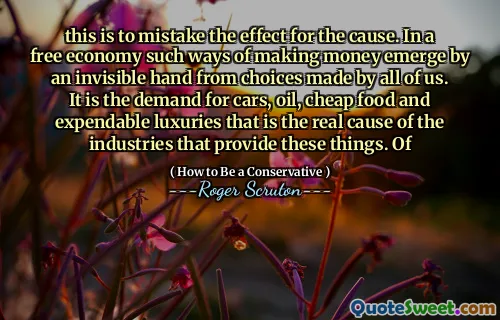
this is to mistake the effect for the cause. In a free economy such ways of making money emerge by an invisible hand from choices made by all of us. It is the demand for cars, oil, cheap food and expendable luxuries that is the real cause of the industries that provide these things. Of
This quote highlights a fundamental economic principle often misunderstood: the distinction between causation and correlation. In a free market economy, consumer preferences and demands drive production and innovation. When people desire cars, oil, inexpensive food, and luxury items, businesses respond by creating industries that supply these goods. This process is famously associated with Adam Smith's concept of the "invisible hand," where individual choices collectively shape the market's direction without deliberate central planning.
The core message warns against conflating the symptoms with the causes of economic phenomena. For example, the proliferation of fast fashion or mass tourism should not be solely attributed to greedy corporations without considering the underlying consumer demand. When consumers prioritize affordability and convenience, markets adapt, often leading to environmental degradation or social issues. Recognizing this dynamic shifts the responsibility somewhat from producers to consumers, emphasizing the importance of informed choices.
Furthermore, this perspective calls into question simplistic narratives that blame industries or capitalism altogether without understanding the complex web of influences. It advocates for a nuanced view, acknowledging that economic activities are responses to genuine human desires. This understanding empowers policymakers, consumers, and businesses to address systemic issues effectively if they focus on influencing demand patterns and ethical consumer behavior.
In essence, the quote challenges us to look beyond superficial causes and understand the intricate feedback loop between consumer preferences and market responses in a free economy.








